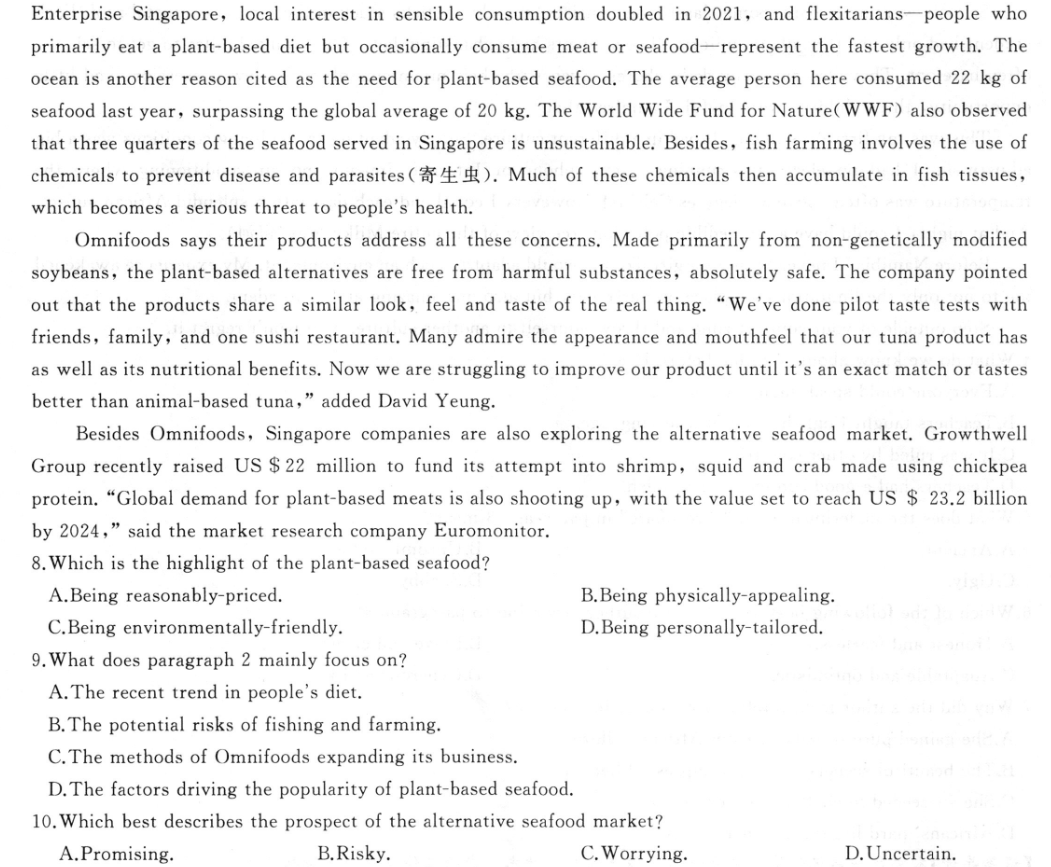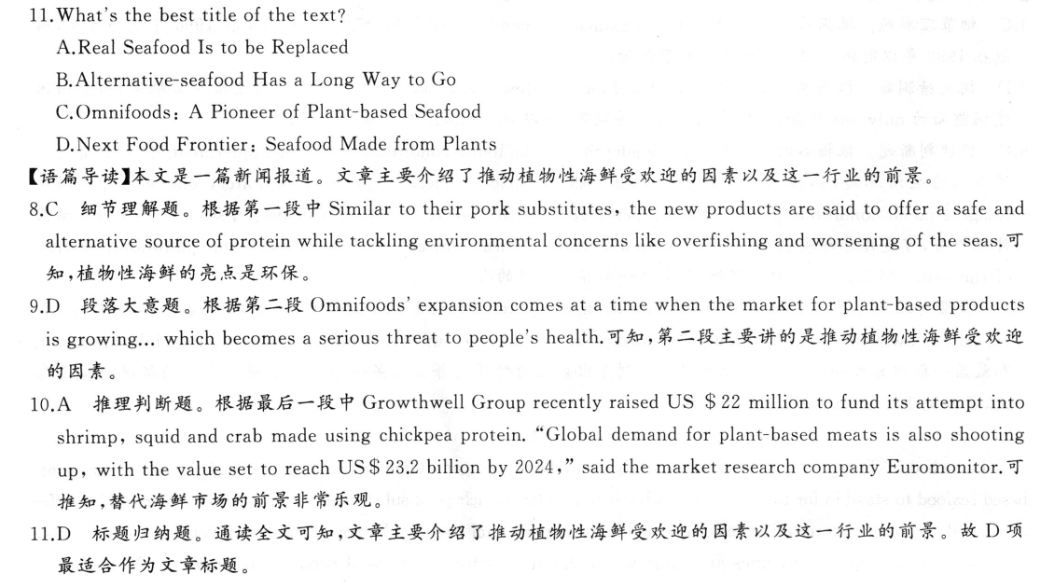
英语周报外研版九年级下册答案



CLaunched in Singapore last November,Hong Kong-based company Omnifoods has introduced a range of six plant-based seafood to stand in for tuna,crab and whitefish.Similar to their pork substitutes,the new products are said to offera safe and alternative source of protein while tackling environmental concerns like overfishing and worsening of the seas.Omnifoods'expansion comes at a time when the market for plant-based products is growing.According toEnterprise Singapore,local interest in sensible consumption doubled in 2021,and flexitarians-people whoprimarily eat a plant-based diet but occasionally consume meat or seafood-represent the fastest growth.Theocean is another reason cited as the need for plant-based seafood.The average person here consumed 22 kg ofseafood last year,surpassing the global average of 20 kg.The World Wide Fund for Nature(WWF)also observedthat three quarters of the seafood served in Singapore is unsustainable.Besides,fish farming involves the use ofchemicals to prevent disease and parasites().Much of these chemicals then accumulate in fish tissues,which becomes a serious threat to people's health.Omnifoods says their products address all these concerns.Made primarily from non-genetically modifiedsoybeans,the plant-based alternatives are free from harmful substances,absolutely safe.The company pointedout that the products share a similar look,feel and taste of the real thing."We've done pilot taste tests withfriends,family,and one sushi restaurant.Many admire the appearance and mouthfeel that our tuna product hasas well as its nutritional benefits.Now we are struggling to improve our product until it's an exact match or tastesbetter than animal-based tuna,"added David Yeung.Besides Omnifoods,Singapore companies are also exploring the alternative seafood market.GrowthwellGroup recently raised US $22 million to fund its attempt into shrimp,squid and crab made using chickpeaprotein."Global demand for plant-based meats is also shooting up,with the value set to reach US 23.2 billionby 2024,"said the market research company Euromonitor.8.Which is the highlight of the plant-based seafood?A.Being reasonably-priced.B.Being physically-appealing.C.Being environmentally-friendly.D.Being personally-tailored.9.What does paragraph 2 mainly focus on?A.The recent trend in people's diet.B.The potential risks of fishing and farming.C.The methods of Omnifoods expanding its business.D.The factors driving the popularity of plant-based seafood.10.Which best describes the prospect of the alternative seafood market?A.Promising.B.Risky.C.Worrying.D.Uncertain.11.What's the best title of the text?A.Real Seafood Is to be ReplacedB.Alternative-seafood Has a Long Way to GoC.Omnifoods:A Pioneer of Plant-based SeafoodD.Next Food Frontier:Seafood Made from Plants【语篇导读】本文是一篇新闻报道。文章主要介绍了推动植物性海鲜受欢迎的因素以及这一行业的前景。8.C细节理解题。根据第一段中Similar to their pork substitutes,.the new products are said to offer a safe andalternative source of protein while tackling environmental concerns like overfishing and worsening of the seas.知,植物性海鲜的亮点是环保。9.D段落大意题。根据第二段Omnifoods'expansion comes at a time when the market for plant-based productsis growing..,which becomes a serious threat to people's health.可知,第二段主要讲的是推动植物性海鲜受欢迎的因素。l0.A推理判断题。根据最后一段中Growthwell Group recently raised US$22 million to fund its attempt intoshrimp,squid and crab made using chickpea protein."Global demand for plant-based meats is also shootingup,with the value set to reach US$23.2 billion by 2024,"said the market research company Euromonitor.推知,替代海鲜市场的前景非常乐观。11.D标题归纳题。通读全文可知,文章主要介绍了推动植物性海鲜受欢迎的因素以及这一行业的前景。故D项最适合作为文章标题。

1.榴莲不易保存,销往全世界需要保鲜技术支撑,故选C。2.榴莲为热带水果,对热量要求高,海南相比东南亚地区纬度较高,主要制约因素是热量,故选D。3.中老铁路经过我国云贵高原和中南半岛,途经地区地形复杂,地质条件不稳定,出于安全考虑,运行时速较低,故选B。

以上就是英语周报外研版九年级下册答案,更多英语周报答案请关注本网站。
本文地址: http://www.ncneedu.cn/post/26364.html
文章来源:admin
版权声明:除非特别标注,否则均为本站原创文章,转载时请以链接形式注明文章出处。
- 04-05 1 英语周报八年级新目标答案第29期
- 04-05 2 英语周报八年级新目标scc答案5
- 04-05 3 英语周报答案七年级上册2022-2023
- 04-05 4 英语周报答案2022~2023
- 04-05 5 英语周报答案八年级下册2023
- 04-05 6 英语周报答案九年级人教版2023
- 02-24 7 时代英语报2022-2023 test7答案
- 02-24 8 双语报答案20222023高三
- 02-24 9 双语报浙江W版中考专版第35期答案
- 02-24 10 双语报英语答案高三课标24期
- 英语周报八年级新目标答案第29期
2023-04-05admin
- 英语周报八年级新目标scc答案5
2023-04-05admin
- 英语周报答案七年级上册2022-2023
2023-04-05admin
- 英语周报答案2022~2023
2023-04-05admin
- 英语周报答案八年级下册2023
2023-04-05admin
- 英语周报答案九年级人教版2023
2023-04-05admin
- 时代英语报2022-2023 test7答案
2023-02-24admin
- 双语报答案20222023高三
2023-02-24admin
- 双语报浙江W版中考专版第35期答案
2023-02-24admin
- 双语报英语答案高三课标24期
2023-02-24admin
